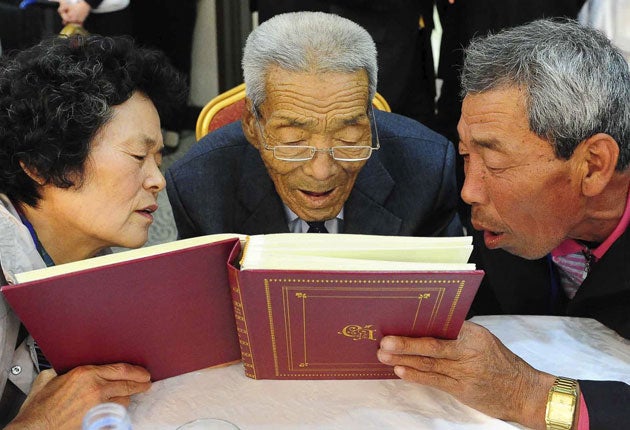Korean families are reunited after 60 years
Relatives who were divided when their country was divided meet again – many for the last time

Your support helps us to tell the story
From reproductive rights to climate change to Big Tech, The Independent is on the ground when the story is developing. Whether it's investigating the financials of Elon Musk's pro-Trump PAC or producing our latest documentary, 'The A Word', which shines a light on the American women fighting for reproductive rights, we know how important it is to parse out the facts from the messaging.
At such a critical moment in US history, we need reporters on the ground. Your donation allows us to keep sending journalists to speak to both sides of the story.
The Independent is trusted by Americans across the entire political spectrum. And unlike many other quality news outlets, we choose not to lock Americans out of our reporting and analysis with paywalls. We believe quality journalism should be available to everyone, paid for by those who can afford it.
Your support makes all the difference.Hundreds of relatives, separated for more than 50 years after the Korean War, embraced each other in tearful reunions yesterday – a day after troops exchanged gunfire in the demilitarised zone dividing the countries.
"I thought you were dead. Mother missed you so much," Lee Min-gwan, 61, from South Korea, told his 90-year-old North Korean father, Ri Jong. "I did not forget you for a single day in the past 60 years," Ri replied to his son, who was 100 days old when they were separated during the war.
Lee was among 436 South Koreans who traveled by bus to North Korea's Diamond Mountain resort to take part in the three-day reunions with about 100 North Korean relatives. On Wednesday, about 200 North Koreans are to begin similar reunions with relatives at the same resort.
Millions of families were separated when the Korean peninsula was divided in 1945. The division was reinforced by the 1950-53 Korean War.
The reunions are emotional for Koreans, as most participants are elderly and are eager to see loved ones before they die. More than 20,800 family members have had brief reunions in face-to-face meetings, or by video, since a landmark inter-Korean summit in 2000. There are no mail, telephone or email exchanges between ordinary citizens across the heavily fortified border.
Those from the north told their southern relatives that they have led a "worthwhile lives", saying all North Koreans "have formed a big harmonious family under the care of leader Kim Jong Il," the country's official Korean Central News Agency reported.
North Korea proposed the reunions – the first in more than a year – in an apparent conciliatory move after tensions flared over the sinking of a South Korean warship in March. An international investigation concluded that a North Korean torpedo sank ROKS Cheonan, killing 46 sailors. North Korea denies any involvement.
North Korea has also freed the crew of a South Korean fishing boat seized in August. In an apparent response to its overtures, South Korea sent 5,000 tons of rice to its neighbour last week, as part of £5.3m in pledged flood aid.
However, last Friday in an abrupt reversal of the apparent thaw in tensions, there was an exchange of gun fire in the demilitarised zone as two rounds were fired at a South Korean guard post. No injuries were reported, and the reason for the attack remains unclear. But the shooting came just hours after North Korea threatened to retaliate for South Korea's refusal last week to hold military talks.
The US-led UN command – which oversees the armistice that ended the Korean War – is considering launching an investigation into the incident, a command official said, on condition of anonymity because a final decision had not been made.
The exchange highlighted the security challenges South Korea faces as it prepares to host next month's G20 summit in Seoul, just 30 miles from the border.
The US Secretary of State, Hillary Clinton, asked China on Friday to use its influence with North Korea to keep it from taking any provocative actions ahead of the summit. Mrs Clinton made the request to the Chinese Foreign Minister, Yang Jiechi, on the sidelines of a summit of east Asian leaders in Vietnam.
Communist North Korea has a track record of provocations against South Korea at times of internal change, external pressure or when world attention is focused on Seoul.
In 1987, a year before Seoul hosted the Olympic Games, North Korean agents planted a bomb on a South Korean plane, killing all 115 people on board. In 2002, when South Korea was jointly hosting football's World Cup with Japan, a North Korean naval boat sank a South Korean patrol vessel near their disputed western sea border.
Join our commenting forum
Join thought-provoking conversations, follow other Independent readers and see their replies
Comments